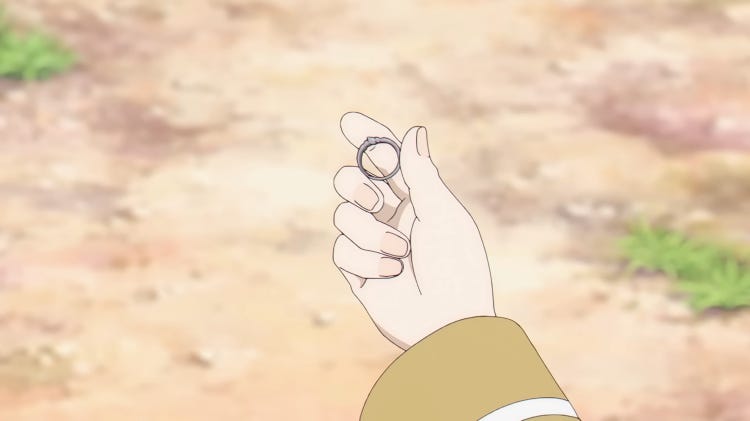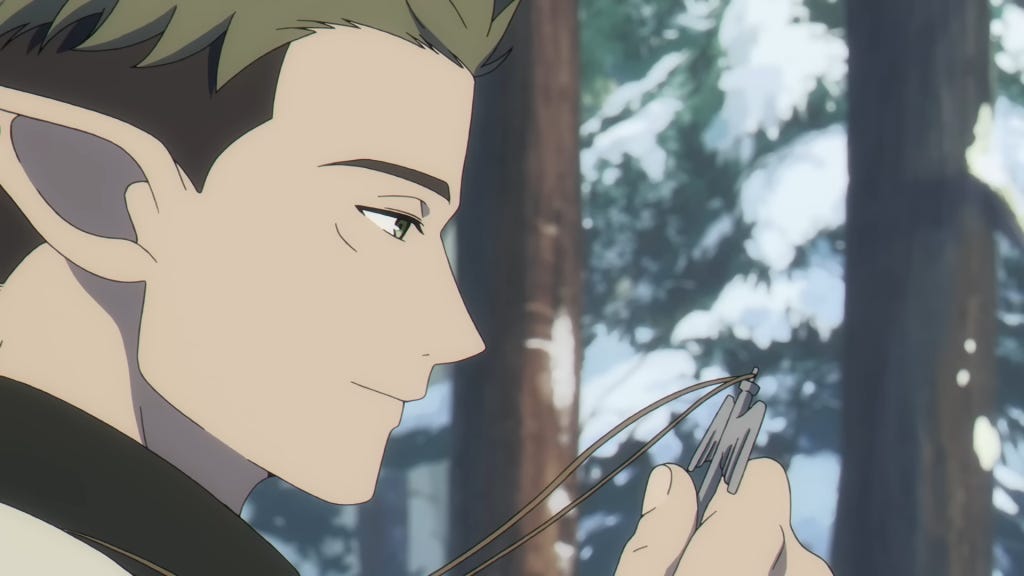Frieren Took Me By Surprise 6: Rings, Spells, and Headpats
And why us creatives must keep writing. What we do is important!
Frieren Understands That Second Chances Are a Blessing
The journey Frieren takes across the continent throughout Season 1 largely mirrors the 10-year journey she had taken with Himmel, Heiter, and Eisen to slay the Demon King.
Everything she experiences this time around not only further informs us about her original journey, but helps Frieren recontextualize everything she'd experienced the first time around.
It's a second chance, and Frieren takes care to not make the same mistakes twice.
Trinkets and "Useless" Spells
In her travels with Fern and the other new companions (Stark and Sein), Frieren performs many small favors, collecting odd knick-knacks and seemingly useless spells as rewards, such as a spell to remove rust from bronze, or make sweet grapes taste sour.
When helping the old woman clean Himmel's statue, for example, she received a spell that can produce warm tea.
In the earliest episodes, it seems like that's what the show is about: A travelogue where Frieren collects useless junk and pours over ancient grimoires to the party's chagrin. Hence the upfront warnings that this show can be slow-paced.
Fern, Stark, and Sein are indeed frustrated and perplexed by Frieren's behavior. Frieren simply shrugs and claims it's her hobby, but the others feel like these quests are a waste of time.
However, nothing in this show is here by accident. It takes time, but eventually, they begin to understand why Frieren does the things she does. And even Fern begins to follow suit, collecting useless spells of her own.
The audience learns who Frieren is and what makes her tick right alongside the party.
So why does she revel in old treasures and trinkets to the point where she's willing to trigger every booby-trapped treasure chest in any given dungeon?
It's because these relics and trinkets represent memories of a time long past. Just like the statues, they are remnants preserving time periods that most humans have forgotten. The people she meets come and go like the seasons, but the trinkets they leave behind last much longer.
Frieren lugs around a suitcase full of trinkets that would seem useless to anyone else, but when she examines these items, they bring back vivid memories for her.
And as important as those trinkets are, the spells are even moreso. She risks every treasure chest particularly for the chance at finding a forgotten grimoire or magic scroll.
Every spell, no matter how quaint, represents someone's life's work. So in a very real way, these spells are lost history - Someone's lost legacy. Humans don't live long, and even elves perish eventually. But spells remain.
It's like how if you were to write a book and publish it, your story will outlive you. It will become part of your legacy, a true heirloom to the human race, and perhaps it will be the thing that outlives you the longest. Through your stories, you will keep impacting the world. That's why it's so important that we write timeless stories in service of the Truth.
So if some intrepid explorer like Frieren comes along and rescues your book from obscurity before it rots away in an abandoned library, and that story still resonates hundreds--or even thousands--of years later, that explorer will have extended your legacy. And your goodness will echo on.
It's like art restoration, rescuing a damaged painting doomed for the dustbin so it can stick around another few hundred years. It's like finding an interesting hand-written diary or unpublished manuscript and publishing it, giving it a second lease on life.
But the importance of spells goes well beyond mere historical preservation - Mortals learned spells by reverse-engineering demon magic.
Of course, demons don't write down their spells because they don't want to share them with mortals. And their spells evolve through collaboration with other demons, causing them to become more efficient and deadly over time.
Frieren is well-vantaged to see this effect on the stage of world history, witnessing firsthand how much more powerful demonic spells have grown over the past 1,000 years.
For example, the devastating spell "Zoltraak" was invented by a demon named Qual who had devised a way to pierce through defensive magic. He went on a vast murdering spree and seemed undefeatable. Even Frieren couldn't defeat him with the help of Himmel's party, so they had no choice but to seal him away instead.
In the eighty years since he was sealed away from the world, universities had studied his magic and reverse-engineered Zoltraak. Magic students learned how to refine their defensive spells to shield against its spell-piercing properties.
So as Qual slept, his trademark spell had gone from the world's most devastating attack to a standard spell that impresses no one. "Ordinary offensive magic."
Despite Qual's spellcasting genius, an 80 year hiatus was more than enough to remove him from the magical arms race. For a modern Frieren and Fern, defeating Qual was trivial.
It's poetic justice when Frieren uses Qual's signature spell to defeat him, since he never learned how to block it.
From a writing standpoint, this is fascinating. Even though the spells you find in the world of Frieren are often unpredictable (like you'd find in a soft magic system), this idea that magic evolves over time as a sort of "arms race" makes it seem like a tangible "hard" magic system.
In such a world, it's crucial for mortals to keep evolving their spells or the demons will win the magical arms race and, in time, devour all humans.
All the little spells, the little innovations, add up over thousands of years. And in that way, the legacies of all the mages who contributed will live on.
Frieren collects random spells to have more options and evolve her technique, developing an edge over other casters while keeping demons on their toes.
The Importance of Jewelry... and Headpats
Conserving the past. History. Books. Statues. Collecting simple trinkets and spells - The permanence of rings and jewelry fit right in.
In part five, I mentioned Fern's locket, how it's her last surviving connection to her parents.
In part three, I said that Frieren's ring is incredibly important to her - the one she rolled between her fingers at Himmel's funeral.
Aside from the statues and the lasting peace, the effects of Himmel's legacy can be seen in the kindness that villagers show toward one another. He also lives on in Frieren's heart, inspiring her to do good deeds, just as he inspired Heiter.
But Frieren was truly special to him. His feelings toward Frieren live on symbolically through this ring. In many ways, it symbolizes their unofficial engagement.
At the time, Frieren was too aloof and disconnected to understand the gravity of that moment. But upon reflection, it pains her. The ring has become nothing less than Frieren's most important possession in the days since Himmel's passing. It has become a symbol that represents a love which survived the grave.
So imagine how devastated she felt when she lost the ring due to a situation beyond her control, her wagon suddenly airborne as the ring tumbles into an expansive forest, hopelessly lost hundreds of feet below.
Fortunately, one of those "useless spells" came in handy to track it down. And the moment she located her ring was nothing short of cathartic.
It's just a thing. Just "stuff". But jewelry, like spells and statues, last. They are heirlooms. They are symbolic of memories. They stand the test of time.
To remind Fern that's she's there, Frieren often gives headpats. And on Fern's birthday, she gave her a fine piece of jewelry.
Fern, beginning to understand why Frieren does what she does, cherishes this hairclip and makes sure to wear it everyday.
This simple butterfly hairclip becomes a symbol of their friendship, and a symbol of the long-lasting impact Fern will have upon the world. Like a caterpillar to butterfly, she will one day blossom into a legendary mage and a beautiful woman. You'll notice that butterflies come up as a symbolic metaphor quite often during Fern's journey.
Fern isn't the only one who receives headpats; Frieren gives all her party members this treatment when they're feeling down. She wants them to know she's there for them, just like how Heiter and Eisen were there for her in her time of need.
She may be a bit awkward about it, but she's learning to sympathize, learning what it means to be human.
Frieren's iconic red earrings are also hard to miss. She wears them because the mage who tutored her, Flamme, wore that same style of earrings.
Though Flamme was an elf, she perished hundreds of years ago. These earrings are one way Frieren remembers and honors her old master.
The other party members eventually puzzle Frieren out and start mimicking her sentiment. For example, Stark gives Fern the real-world equivalent of a Claddagh to show her how much he cares for her.
Even Kraft the elf had jewelry to help remind him of his past.
But to show all the jewelry in Frieren and explain its meaning would be an essay in and of itself. I'll just say it was a joy learning the meaning behind these items while getting to know the characters.
Our Timeless Stories
Every spell, no matter how small, was the result of hard work and research. It's just like the stories we write. These timeless tales will pass onto our children and our children's children. They will live on, long past our own lives.
And every tale we tell, no matter how insignificant they may seem, will help evolve the art of storytelling over time.
They will be the way we are remembered. That's why it's so important that our stories not be about Current Year, but instead focus on immutable truth.
You see, the demons are telling stories, too. And us mortals need to stay ahead of their storytelling technology.






















These lines—and the reasons behind them—really resonated with me:
“So if some intrepid explorer like Frieren comes along and rescues your book from obscurity before it rots away in an abandoned library, and that story still resonates hundreds—or even thousands—of years later, that explorer will have extended your legacy. And your goodness will echo on.”
I often ask myself—or get asked—“Why do you write?” And honestly, this is one of the best and most meaningful answers I’ve come across. When writing isn’t just a means to an end, like making money, it takes on a whole new depth. It becomes something lasting, something that carries weight beyond the moment.
Good word, my man!
>seemingly useless spells as rewards, such as a spell to remove rust from bronze, or make sweet grapes taste sour.
I recall a conversation had on a gaming Discord about an archlich's most valuable spell, after many decades of research, trial and error, centuries of perfection... "Cheese to Different Cheese". Sure sure, biggest fireball is important when you face down armies of mooks... or that demon-killer spell when you face archdemons... but the knick-knack utility spells is where you really find things shine.